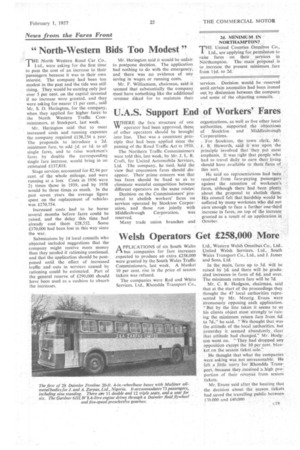U.A.S. Support End of Workers' Fares
Page 57

If you've noticed an error in this article please click here to report it so we can fix it.
WHERE the fare structure of one v, operator had been approved, those of other operators should be brought' into line. That was a consistent principle that had been applied since the passing of the Road Traffic Act in 1930.
The Northern Traffic Commissioners were told this, last week, by Mr. J. L. R. Croft, for United Automobile Services, Ltd. The company, he said, held the view that concession fares should disappear. Their prime concern was that bus fares should be fixed so as to eliminate wasteful competition betweendifferent operators on the same routes:
Decision on the Commissioners' proposal to abolish workers' fares on services operated by Stockton Corporation, and those run jointly with Middlesbrough Corporation, was reserved.
Marty trade union branches and organizations, as well as five other local authorities, supported_ the objections of Stockton and Middlesbrough Corporations.
: For Stockton, the town clerk, Mr. J. B. Haworth, said it was upon the Principle involved that they put most emphasis. It was right that people who had to travel daily to earn their living should have available to them fares of this sort.
He said no representations had been received from fare-paying passengers against the retention of workmen's fares, although there had . been plenty about the proposal to abolish them. His council felt that hardship would be suffered by many workmen who did not earn enough to face a further one-third increase in fares, on top of the increase granted as a result of an application iri October.




































































































